by Kristin Distel
Dr. Edmond Y. Chang led his students into battle. Armed with padded weapons and homemade shields, the group conducted Live-Action Role-Playing (LARPing) in a fantasy universe of Chang’s creation called Archaea.
LARPing served as experiential learning for the Fall 2018 course, allowing students to put into practice their classroom discussions about fantasy literature and popular culture.
Chang, Assistant Professor of English at Ohio University, titled the ENG 2100 course “Why are Americans Afraid of Dragons?: Critical Approaches to Reading, Writing, and Playing Fantasy.” Throughout the semester, he encouraged his students to think critically and creatively about fantasy literature, fairy tales, and the ways in which popular literature represents race, gender, and sexuality.
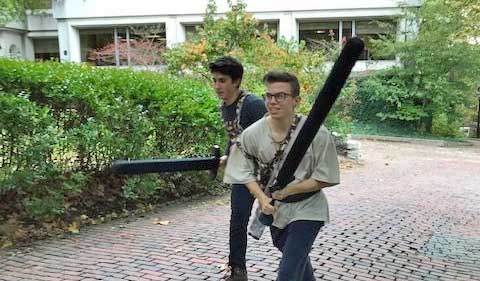
From left, Grant Crawford and Alex Petras get ready for Live Action Role Playing, their padded weapons held aloft.
“LARP was a clever choice! It let us get hands-on experience with the fantasy genre with something more interactive than reading novels,” states Ashley Safran, a sophomore Creative Writing major. “LARP allowed me to become better friends with my classmates while analyzing the fantasy genre from a different perspective,” she adds.
The class’s structure and engaging assignments clarified for students the link between the theory and practice of fantasy literature.
“The course began as a more traditional literature course. We read some ‘foundational’ fantasy texts including fairy tales, Tolkien, and Le Guin. Then we moved into watching two documentaries about LARP: Monster Camp and Darkon. Then we segued into actually playing fantasy,” Chang explains.
He notes that explicitly addressing stereotypes and barriers within this genre was a fundamental part of the course.
“Given the arc of the course from fantasy written primarily by white authors to fantasy written by writers of color, the course hopes to identify the norms of fantasy and to revel in the ways those norms are being challenged, broken, and recreated,” he remarks.
Creating a World of Villagers, Mystics, Knights, Farmers, Healers, Shadow Characters
Chang describes Archaea as “a comprehensive and detailed world with over 2,000 years of history, 20 distinct provinces, and 25 character organizations.” The students were divided into groups of villagers, mystics, knights, farmers, members of the House of Healers, and shadow characters.
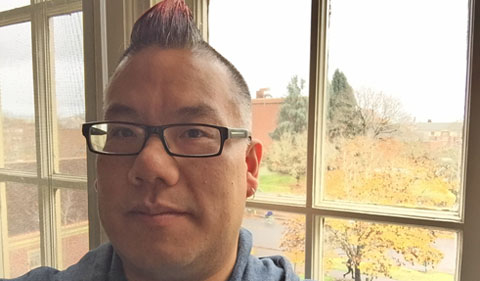
Dr. Edmond Y. Chang
Chang created Archaea 25 years ago, and he has been revising and building upon it ever since.
“I wanted to create a LARP that foregrounded characters, story, high fantasy, and collaborative play. The rulebook has gone through a number of iterations. Long before I became an academic, I ran an Archaea group in Maryland for many years. The class is working with the fifth edition. I picked this game because I was already familiar with the rules, the world, and had a lot of experience running the game. I did recently complete a new revision, the sixth edition, which is available via Amazon’s CreateSpace.”
Archaea is reflective of Chang’s larger interest in game studies, identity studies, and fantasy literature.
“Though I mostly research and write about digital games, primarily thinking about the algorithmic ways that gender, race, sexuality get encoded and enacted by games, I am also interested in games in other contexts. I am currently working on an essay on LARP and queerness. I would love to do more in role-playing game studies, particularly looking at pen-and-paper, tabletop games. But I am also interested in literature, in science fiction and fantasy, and in how these genres offer insights and critiques of the ‘real world’ and how they offer us utopian and dystopian lenses,” Chang explains.
Understanding the Realm of Fantasy
In Chang’s class, each student group had a different assigned goal, which often conflicted with the other players’ tasks. The knights and healers, for example, had been charged with delivering a chest that the farmers had stolen; the knights and healers merged a different group of mercenaries but had different goals.
Students noted that they enjoyed the opportunity to think creatively and to design characters that reflected a range of identities, interests, and traits.
“LARPing Archaea has helped me better understand the realm of fantasy. As a fan of fantasy literature and media, I have learned that each story, each realm is just a little bit different. For Archaea, I was able to create my own character, her backstory, and her skills,” Safran states.
“Each player was presented this same opportunity, and we all ended up with completely different characters. It is fascinating to see how everyone approaches each element of Archaea, like combat and solving problems in the main story, because—like with creators in the fantasy genre—we all approached the game itself in separate ways,” Safran adds.
Probing Gender, Race, Sexuality, Disability in Fantasy
Chang structured the course so that students could readily observe the important connections between the assigned readings, writing projects, and LARP events.
“All throughout the weeks, students had opportunities to write Critical Response Papers, which are single-page, single-spaced analyses of the given week’s fantasy text supported by the week’s scholarly readings. Alongside play, they completed plogs (or play logs) to reflect on their LARPing experience, again connecting play to discussions and readings on things like gender, race, sexuality, disability in fantasy and in LARPs,” Chang explains.
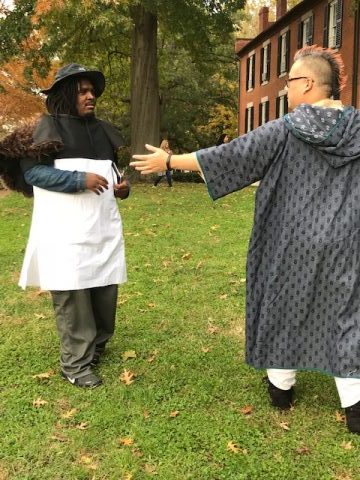
Dr. Chang (right) helps student Dominique Edwards strategize
Students also completed a final project that allowed them to choose among writing a traditional research paper, a multimodal assignment, or a creative project that “asked them to generate a claim and extended argument about the genre of fantasy,” Chang says.
Multimodal and creative projects had to include a “project statement” or “artist’s statement” that incorporated significant research and scholarship. The result was a rich variety of final projects that demonstrated students’ keen interest in the way that fantasy literature and experiential learning, such as LARP events, treat intersectional identities.
One student, for example, created a podcast about representations of people of color in fantasy literature and her experience with LARP. Another student wrote a fantasy film script that pointed out and challenged the genre’s tropes.
The range of assignments and opportunities for experiential learning served Chang’s students well, and they responded enthusiastically to his innovative approach.
“The class taught me that fantasy is a genre that is continuously evolving, a genre that can be used for so many purposes, whether that is to entertain, to escape, to be critical of the real world, or more. My eyes have opened to a much broader view of my favorite genre of literature,” says Casee Ontko, a junior Creative Writing major.
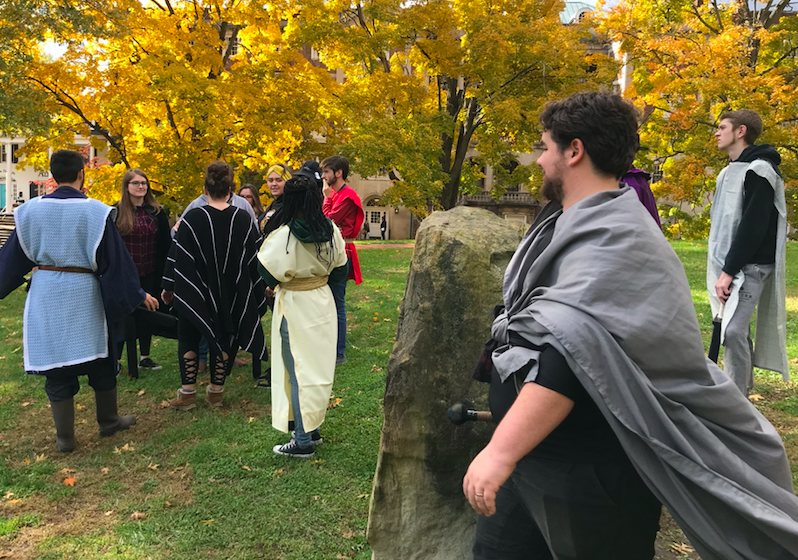
Students plot their plan of “attack”
Presenting Curriculum to the Campus Community
On April 30, Ohio University will host a Spotlight on Learning Conference, the theme of which is experiential learning. Chang notes that this conference is an ideal space in which to share his innovative LARP curriculum with the campus community.
“Using an experiential lens allows students to gain confidence, to learn collaboratively, and to value teamwork. I set out to design a course that would put literature, narrative, and games into action. Courses like this would make a valuable addition to the university’s honors curriculum,” Chang explains.
Safran concurs with Chang about the widespread appeal and far-reaching benefits of experiential learning and LARP.
“Anything is possible in fantasy, and I think that’s something truly amazing!”


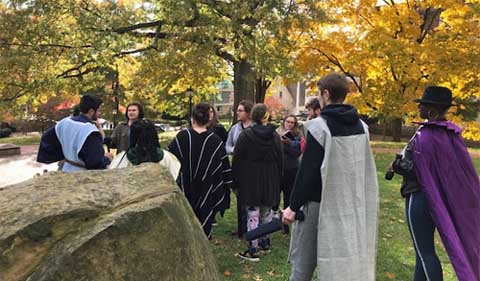
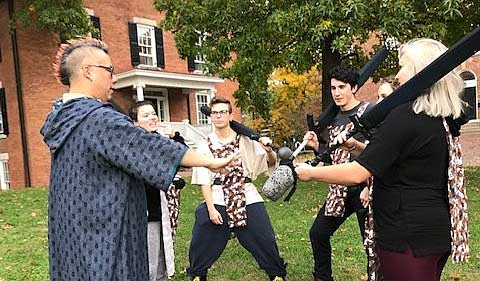
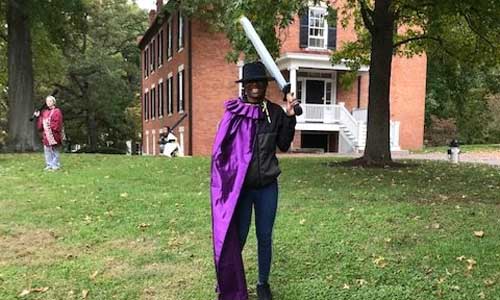
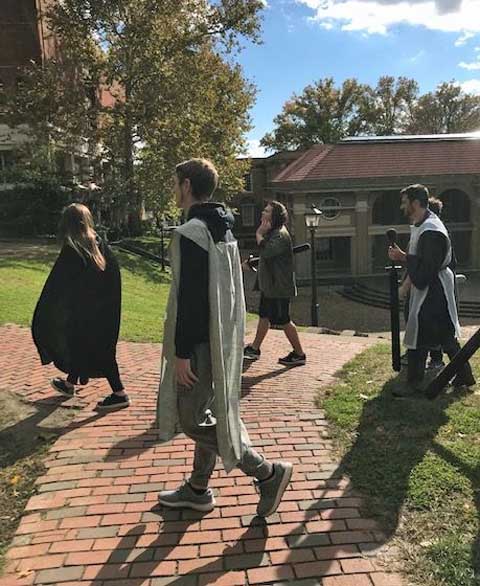

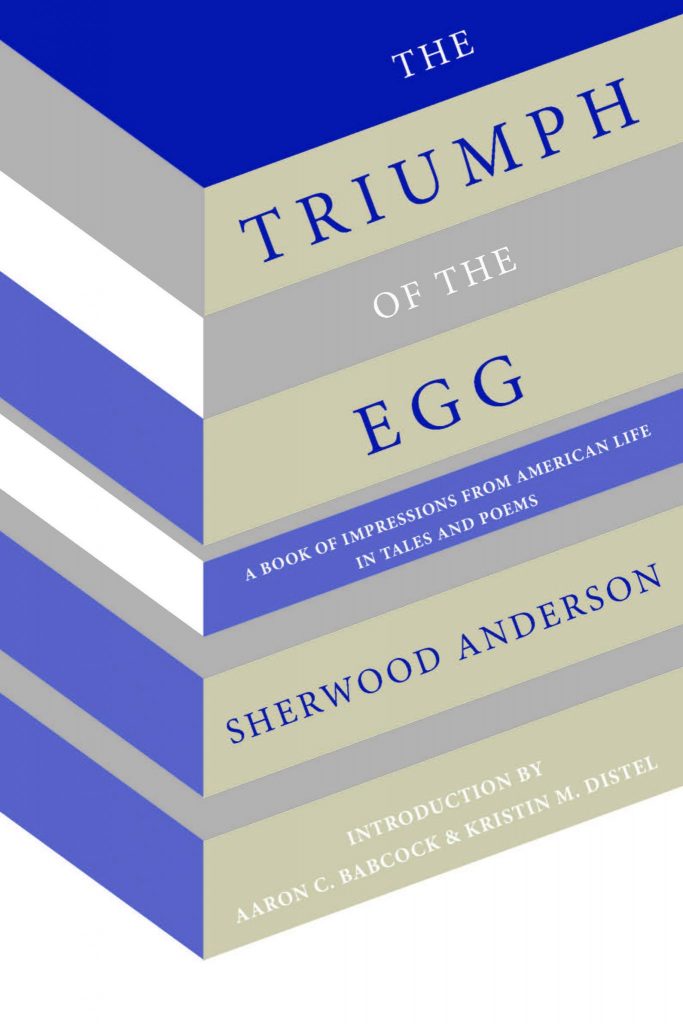















Comments